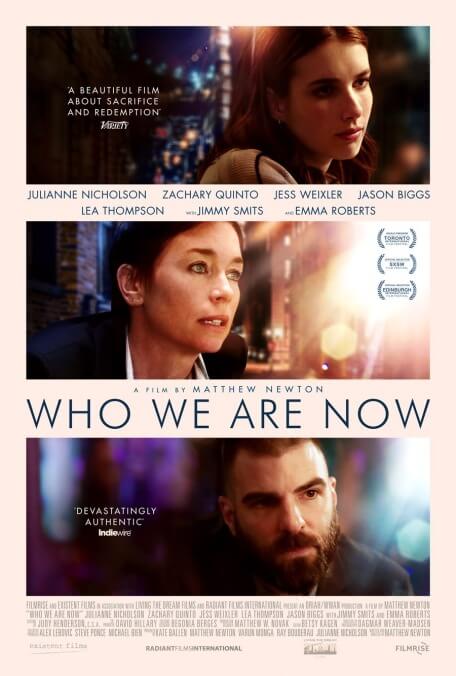The terrific, unsung Julianne Nicholson finds no easy answers in Who We Are Now

In movies, as in politics, it’s not necessarily advantageous to acknowledge that everyday problems are often insurmountably complicated, with no easy answers. One of the best films released last year, From Nowhere, was seen by almost nobody (not even by critics, excepting those of us who were assigned to review it); writer-director Matthew Newton tackled the plight of Dreamers with uncommon frankness and candor, and even saw his film released shortly after the controversy stemming from the Trump administration’s first iteration of the travel ban. But that wasn’t enough of a hook to grab people’s attention. Hopefully, the same commercial fate won’t befall Newton’s equally strong follow-up, Who We Are Now, which lacks a topical angle of any kind but does at least boast a more recognizable cast. Once again, he refuses to pretend that lives in disarray can be magically repaired by good intentions, while simultaneously avoiding the defeatist attitude that insists there’s consequently no point in even trying. (His own history, which includes multiple assault charges in his native Australia, may have something to do with that.)
Whereas the three undocumented teens in From Nowhere struggled with a crisis imposed upon them by their parents and the U.S. government, Beth (Julianne Nicholson) has only herself to blame for her predicament. Recently released from prison after a 10-year manslaughter bid (the details of which Newton withholds for perhaps an unnecessarily long time), she’s determined to regain custody of her son, Alec (Logan Schuyler Smith), who’s been raised by her sister, Gabby (Jess Weixler), for his entire life. At the very least, Beth would like to see the boy occasionally, and have him know who his real mom is. Gabby, however, considers Beth an irredeemable fuckup with no business being a parent, and what we see of Beth’s erratic behavior doesn’t flatly contradict that assessment. Meanwhile, a separate narrative focuses on idealistic young lawyer Jess (Emma Roberts), who works for Beth’s pro bono attorney (Jimmy Smits) but has nothing to do with that particular case, instead spending her days advocating for people being chewed up by the system. There’s little doubt that these two women will eventually find each other, but their connection leads to neither uplift not tragedy. It’s messier than that.
A perpetually underrated actor still awaiting her breakout role, Nicholson (who played a smaller, radically different part in From Nowhere) gives no emotional quarter, conveying Beth’s earnest desire to turn her life around without shying away from the self-destructive qualities that scuttled it in the first place. She’s nicely matched here by Roberts, who radiates the delusional conviction of someone who hasn’t yet accepted and internalized the world’s fundamental unfairness. Indeed, there are no straightforward heroes or villains here—even the movie’s most repugnant character, a restaurant manager (Jason Biggs) who offers the desperate Beth a job in exchange for a blowjob and then hires someone else after she acquiesces, gets a moment that acknowledges him as a three-dimensional human being around whom an entirely different movie could conceivably be constructed. Newton’s screenplays still suffer from third-act problems—both From Nowhere and Who We Are Now conclude with an ironic twist that feels slightly cheap—but his dedication to fine-grained real-world complexity sets him apart from most indie filmmakers these days. It may not be a recipe for box office success, but at least the handful of folks who see them will be amply rewarded.